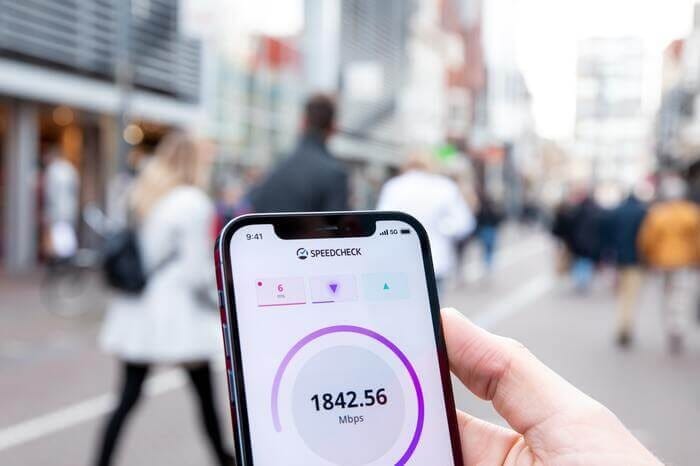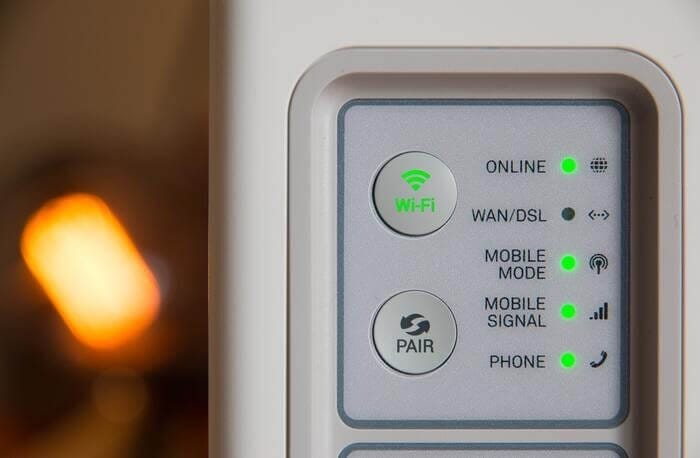How to Set Up Vacation Home Internet in a Rental Property

Access to high-speed, reliable internet services is no longer a nice-to-have luxury feature for your short-term rental. It does not matter which zip code you’re in, nor whether you mostly host adventure seekers exploring the great outdoors or business travelers, wireless internet has become an expectation for most people while traveling.
As a matter of fact, one of the first things that they will probably look up after checking in is your Wi-Fi username and password.
Though, getting it set up at your vacation property can be more of a struggle than shopping for a new coffee machine. To help you, we have created this five-step guide on how to set up vacation home internet in a rental property and share some practical tips for letting this feature work for you.
Is It Necessary for My Vacation Rental Home to Have Internet?
Yes! Internet connection or a mobile hotspot is fast becoming one of the most popular amenities and many guests view it as a standard feature. If you do not include it in your list of amenities, your occupancy rate will suffer as guests will prefer similar listings that include internet over your listing.
How Much Does It Cost to Set Up Internet in a Vacation Rental Property?
Internet costs are impacted by the type of connection you get as well as the service provider. If you are lucky to have fiber available in your area, you can expect to pay about $55 per month for 300 Mbps speeds over a fiber-optic connection.
For a 4G or 5G connection, you can expect to pay more or less the same per month, though your speeds will be slower. DSL also falls within this price bracket, and it can range from $37 per month to $70 per month.
Cable is slightly cheaper than 4G, 5G, and fiber internet and, in the US, you can get a plan for as little as $20 per month for 100 Mbps speeds.
How to Set Up Internet in a Rental Property: 5 Simple Steps
While understanding terms like Wi-Fi, fiber-optic connection, and megabits per second (Mbps) requires some technical knowledge, setting up the internet in a rental property is much simpler. To help you with the process, here are the main steps and considerations:
1. Decide what type of internet you need
After you have decided that it is high time to invest in internet for your vacation rental, you still need to decide which connection type will be best for your property and target market’s needs. You might be surprised to learn that there are actually several different types of internet connections available. Here are the main options that you can choose from:
- Fiber connection
A fiber-optic connection type is like the Rolls-Royce of internet connections. Not only does it offer very high-speed internet (it can deliver speeds of up to 1,000 Mbps), but in many instances, it is not that expensive.
The only real potential issue is availability, especially if your property is located in a remote location. The internet provider first needs to build the infrastructure for fiber which can be an expensive, time-consuming exercise.
That said, it is viewed as the best quality and most reliable internet that delivers faster speeds than other options. Therefore, it is the ideal choice, especially if you are targeting business travelers and digital nomads who require faster speeds for video calls.
- 4G/5G (LTE)
4G supports various types of traffic and offers great VoIP capabilities and bandwidth. 5G builds on the success of 4G and offers faster network speeds and real-time communication capabilities.
It operates similarly to wireless communications systems and uses radio frequencies to transmit data via the air. It’s still relatively new technology, though, but it’s expected to support as many as 1,000 devices per meter and deliver data speeds that are 100 times faster than 4G.
- Cable internet
If you have cable TV, cable internet will be familiar to you, as the wiring and cable providers are the same. Installing a cable modem can be an option if you do not expect that your guests will use the internet a lot. It gets the job done in most cases, but bear in mind that its speed is slower than fiber (especially when it comes to upload speeds which becomes important if you want to work remotely).
- DSL
Compared to fiber and cable internet, DSL is much slower. It is usually offered by a phone company and uses a landline phone network.
All in all, it is best suited for users with very basic needs. So, if you know that your guests will want to use streaming services like Netflix or Hulu, going this route won’t work that well.
- Satellite internet
Investing in satellite internet should be your last option. While a satellite dish will work in most locations, the speed is very slow.
2. Decide which internet speed and bandwidth you’ll need
The internet speed and bandwidth will impact the price that you will need to pay. While you will want to keep your costs down, it is also not a good idea to opt for a slow speed and a small, limited amount of bandwidth which can end up frustrating your guests.
- Internet speed
You might not have as many internet service providers to choose from, but you will at least be presented with a number of different subscription plans depending on the speed that you will need. With anything lower than 25 Mbps, you will be able to stream music and TV shows and download small files. It is a good option if you mostly host solo travelers. That being said, a package with a faster speed is not significantly more expensive and will deliver a much better guest experience.

If you want to stream movies in 4K, you will need a speed closer to 100 Mbps. Though, with a speed of 25 Mbps, you will also be able to stream movies in 1080p comfortably and run smart home devices, a great investment for vacation home rentals.
Anything higher than 100 Mbps is more aimed at guests who will be downloading and uploading on multiple devices simultaneously. So, for hosting a single business traveler these incredibly high speeds will be overkill.
- Internet bandwidth
When it comes to bandwidth, you have a few options. You can either opt for a limited number of gigs or go with uncapped. If you can afford it, uncapped is best. Your guests will be able to stream movies that require a lot of data, while you do not have to worry about unexpected costs.
However, if uncapped internet is a little out of your price range, the general idea is to opt for as many gigabytes as you can afford.
3. Choose your internet service provider
When it is time to select an internet service provider (ISP), it can be a good idea to ask your neighbors for their recommendations. Location can play a huge impact on the availability of internet service providers and while you might not have a long list to choose from, other users in the area will be able to give you a reliable review of their experience.
It is also important that you clarify important terms with the shortlisted internet providers yourself. To avoid nasty surprises, be sure to ask them directly what equipment will they supply as part of the internet setup package and what you will need to buy yourself.
It is also a good idea to ask what installation services they provide and what will require self-installation.
- Best internet service providers for vacation rentals
To help get you started, here are some of the best ISPs specifically for vacation rentals:
To elevate your internet offering further, you could use innovative vacation rental Wi-Fi software. Using Wi-Fi software tools that are tailored to vacation rentals will set your vacation home apart from other hosts. For example, StayFi allows hosts to brand their WiFi for guest logins, collects guest emails for effortless guest messaging and communication, and increases direct bookings – all while providing a better Wi-Fi experience for guests.
4. Set a date for your internet provider to install your internet and Wi-Fi
Newer properties might have the wiring installed already, which will make the whole process much easier. In fact, in this case, you might even be able to install the internet on your own instead of hiring professionals. Otherwise, you will need to set up a date with the internet provider that offered you the best deal.
5. Choose a name and password for your newly installed internet connection
Your username and password are key security measures. While it is best to select a guest-friendly password, it should still be secure. It is also recommended that you change the password after each guest’s stay.

3 Top Tips For Giving Your Guests Internet Access
Now that you know how to get your internet up and running, the next part that you’ll need to plan out is the best way to give your guests access to it. Here are three important tips to keep in mind:
1. Communicate the Wi-Fi name, password, and connection instructions automatically before arrival
A best practice is to include the username, password, and other connection instructions in a welcome book or welcome letter. With the help of vacation rental software like iGMS, you can set it up so that this information gets sent automatically. This way, guests won’t have to ask for these details and you will have one less task that needs your attention.
Similar to how a fast internet plan is a must-have feature for guests, automation software has become an indispensable tool for hosts and property managers. In addition to automating check-in instructions and messages, it offers many other benefits. For example, by using iGMS, you can look forward to key automation features like:
- Automating the process of guest reviews
- Creating and coordinating cleaning tasks with live tracking to completion
- Creating your own direct booking website
- Managing direct bookings using a direct booking management toolkit
2. Communicate important information
Guests appreciate open communication. So, if there is other important information about your internet connection that you need to share, do so in advance. Don’t try to hide potential issues like weaker Wi-Fi in certain areas of the house or slower download speeds during peak time from your guests. By knowing these details, they can plan around it, which they will mind much less than being totally blindsided.
3. Don’t forget to set out internet usage terms and conditions
It is important to set terms and conditions for using the internet. Not only will rules about acceptable use and a disclaimer help you to save money, but they can also offer you legal protection.
Common rules include:
- No accessing of illegal sites
- No changing of the password
- No uploading/downloading of pornographic material.
Depending on your plan, you might also want to consider setting a data limit or limiting the download of large files.
Then, it is also a good idea to create a disclaimer. In this section that you can include in your house rules, you can highlight that you are not responsible for misuse of the internet and that guests’ internet rights can be revoked if they break any of the rules.

Vacation Home Internet FAQs
- What Is the Difference Between Broadband and Wi-Fi?
In short, Wi-Fi refers to a wireless connection. With the help of Wi-Fi, you can connect your mobile device to a router which will then connect it to the internet. Broadband, on the other hand, refers to the type of technology that is used to link you to the internet.
- How do I secure my vacation home internet?
After you have paid the installation fees and your wireless internet is up and running, your work is not quite done yet. It is key that you follow best practices to secure your vacation home internet.
You can do this by changing the default username and password so that it is more secure and switching off your Wi-Fi network when it is not in use. Then, with regards to your router, it is best that you position your wireless router in the middle of the house and ensure that its software remains up to date.
- Should I charge my guests an extra fee for the use of Wi-Fi?
It is better to take the price of the internet into account when setting your nightly rates so that it is included in the price. Charging an extra fee to be able to use the Wi-Fi can be interpreted as being greedy. Plus, considering that it has become an expectation that hosts will provide internet, it can come as a shock for this not to be included in the price.
- How do I manage the internet in two or more homes?
The best solution is to have two separate accounts. You will also need to have separate modems or routers for each property as the equipment has been set up to work with a specific address.
If you use the same internet service provider for both rental properties, you will most likely be able to access the separate accounts by means of one log-in. So, staying on top of your monthly bill won’t be a hassle. Plus, you might also be able to negotiate a better rate.
- How do I test my internet speed?
It is a good idea to test your speed to ensure your plan is delivering on their service before your vacation rental guests arrive. To test your internet speed, you can use an internet speed checker like HighSpeedInternet.com. At the click of a button, you will be able to see what your current speed is and how it compares to other internet speeds.
Then, it is also a good idea to add the speed results to your Airbnb listing page, if you are using their platform. All you need to do is:
- Open your Airbnb app the next time that you are at your property
- Select the listing and go to Amenities (found under About The Listing)
- Click on Wi-Fi and select Add Details
- Here you will see a Test Wi-Fi Speed option
- Start the test and click on Save for the results to be displayed on your listing page.
Conclusion
Over the last few years, great advances have been made when it comes to internet accessibility, speed, and cost. In fact, there is no reason why you should not offer your guests free Wi-Fi. It will help you to attract more bookings and deliver a far superior guest experience. Plus, considering that there is a wide range of smart home devices that use Wi-Fi, it really is a great investment overall.
About the Author
Callan Riddles is a former Content and Social Media Specialist at iGMS. Callan has a passion for finding new ways to help vacation rental businesses thrive. In her free time, she loves to travel, read, and experience all the new things that life has to offer.




![Complete Vacation Rental Email Marketing for Hosts [+ Top Tools]](/content/images/size/w600/2026/01/email-marketing.jpg)
